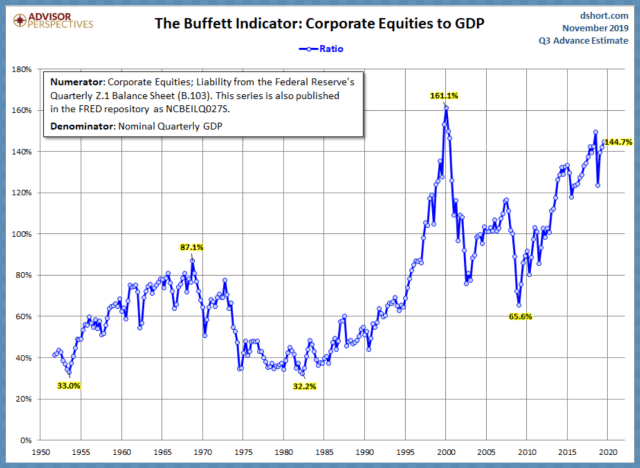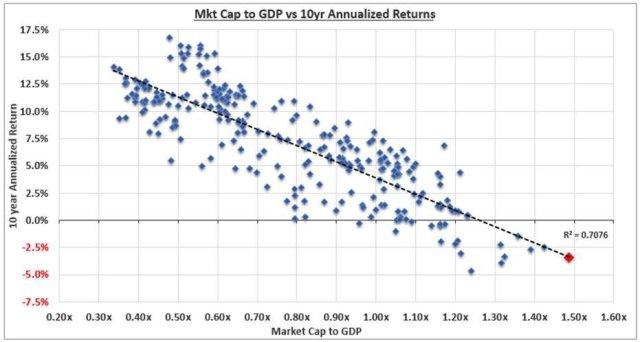Present Equity Valuations Suggest Negative Returns For Next Decade
by Danielle Park, CFASummary
- In terms of Buffett's self-proclaimed favourite value indicator, as shown below, the S&P 500 is now priced at 144% of US GDP, far above the 2007 top, and near the short-lived highest-ever valuations in history at the tech wreck peak in 2000.
- While the market capitalization (price x number of shares) of the S&P 500 has been 'bought up' on cheap credit and corporate buybacks to a record $25.6 trillion, S&P 500 revenues have grown at a nominal rate of just 4.1% annually over the last 15 years.
- As a result, US stocks are now trading at 2.25 x revenues in 2019 - the most extreme multiple of corporate revenues in history, and compares with 1.77x in December 2000, 1.47x as the 20-year median, and .80 at the market low in March 2009.
Lest we kid ourselves, stocks today are everything but attractive investments. In terms of Buffett's self-proclaimed favourite value indicator, as shown below, the S&P 500 is now priced at 144% of US GDP, far above the 2007 top, and near the short-lived highest-ever valuations in history at the tech wreck peak in 2000.

While the market capitalization (price x number of shares) of the S&P 500 has been 'bought up' on cheap credit and corporate buybacks to a record $25.6 trillion, S&P 500 revenues have grown at a nominal rate of just 4.1% annually over the last 15 years. As a result, US stocks are now trading at 2.25 x revenues in 2019 - the most extreme multiple of corporate revenues in history, and compares with 1.77x in December 2000, 1.47x as the 20-year median, and .80 at the market low in March 2009.

Why does this matter? 'Cause there's no free lunch! As shown below, the present level of extreme overvaluation in equities (market cap to GDP on lower axis) is very rare and has historically meant negative annualized returns (upper axis) for at least the next 10 years thereafter (see red diamond below).
All of this is real-life relevant for a North American population that has 10,000 people reaching age 65 every day and tens of millions hoping to cease working by that age and earlier. Most spent the bulk of the last decade just growing back capital losses from the 2008 meltdown and have only recently begun making positive headway again.
A decade of negative returns going forward will be brutal on capital shortfalls and the millions that are already retired or hoping to be so. Studies show that capital losses later in life are hard to recover and tend to have a lasting negative impact on one's life plan and happiness thereafter. This time is unlikely to be different. Prudent financial management is generous to those who elect patience and obscene risk-avoidance. Present circumstances suggest no other rationale course.
Disclosure: No positions
Editor's Note: The summary bullets for this article were chosen by Seeking Alpha editors.